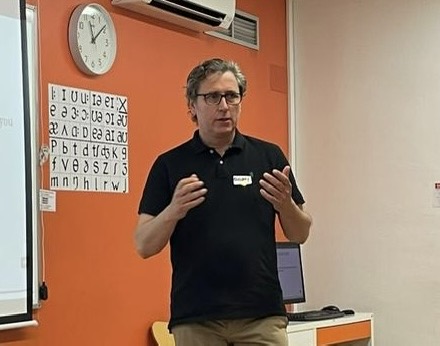Scott Thornbury workshop in Barcelona
- Barnaby Griffiths

- May 30, 2023
- 2 min read

As a member of TESOL Spain I was invited to a workshop in Barcelona on 26th May given by Scott Thornbury, my former Diploma tutor back in the day. The workshop was called “10 methods, 10 activities”, and since I’m always very keen to test my approach to Language Coaching against the hypotheses of what great ELT minds like Scott’s think when it comes to language acquisition, I was really excited to attend. The workshop was vastly oversubscribed, as you would expect for a speaker of Scott’s stature, so I was lucky to get a place.
Scott started by discussing David Nunan’s definition of method as “a single set of procedures that language teachers are to follow”, noting how this suggested that the term method was very prescriptive, as opposed to the term methodology, which refers to what teachers do in a classroom.
He then said something which struck me as one of the most important points of the workshop - that there have only really ever been two methods in language teaching:
- those that replicate L1 learning, such as immersion, etc. and
- those that espouse using the brain and cognitive functions to learn
…although perhaps there are some fuzzy areas in between.
I’m glad to say while dissecting ten methods of language teaching over the course of an hour and a half, Scott confirmed the usefulness of many of the techniques I have refined in my own approach to language coaching, including:
- judicious use of L1 and translation
- repetition of language, but only when meaningful
- making learner-generated content paramount
- a focus on intelligibility over accuracy
- authentic texts only
- reading aloud, but involving language processing in the task, i.e. making it meaningful (again)
- task repetition but with little tweaks in language, timing, partner, etc.
- building up exposure to L2 through extensive listening and reading
He also added that he believes “there is mileage in the manipulation of patterns”, which is one of the foundations of my own approach, so I was very happy with that!
In my approach to language coaching, I try to help my learners move towards what the coach Timothy Galwey called “natural learning”, i.e. what works best for each individual learner, rather than imposing a one-size-fits-all method, a sentiment Scott also echoed in his workshop.
So all round, a morning well spent in the company of an ELT luminary. Thanks, TESOL Spain and thanks again Scott Thornbury.
I’m also delighted to announce that following my workshop at iELT22, I’ve been asked to write an article on language coaching for the TESOL Spain newsletter, so keep an eye out for that. Exciting times!


Comments